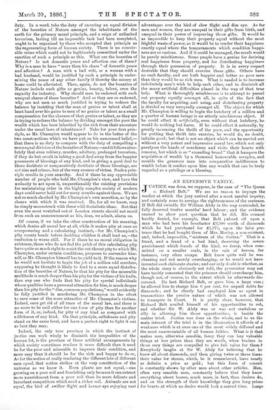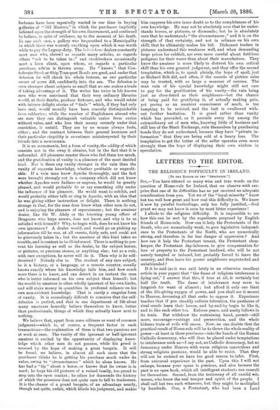AN EXPENSIVE VANITY.
JUSTICE was done, we suppose, in the case of "The Queen v. Richard Belt." We see no reason to impugn the verdict at which the jury arrived after a most careful inquiry,
and certainly none to arraign the righteousness of the sentence.
If Belt did swindle Sir William Abdy in the way contended, he fully deserved twelve months' hard labour ; and the evidence seemed to show past question that he did. His counsel hardly denied, for example, that Belt palmed off upon a man who had been his benefactor £3,500 worth of diamonds which he had purchased for £1,975, upon the false pre-
tence that he had bought them of Mrs. Morley, a non-existent, and, indeed, impossible, "mistress of the Sultan." That is a fraud, and a fraud of a bad kind, deserving the severe punishment which frauds of the kind, we fancy, when com- mitted on a smaller scale, in the sale of horses, for instance, very often escape. Belt knew quite well he was cheating and not merely overcharging, or he would not have invented such elaborate stories ; and our only doubt is whether, as the whole story is obviously not told, the prosecutor may not have tacitly consented that the prisoner should overcharge him, though not, of course, to the extent which he afterwards dis- covered. He lent Richard Belt, or gave him, a large sum ; he allowed him to charge him 6 per cent. for unpaid debts for diamonds ; and he clearly had employed him as agent in transactions the precise nature of which was not allowed to transpire in Court. It is pretty clear, however, that Richard Belt availed himself of his opportunities to rob, and whether Sir W. Abdy was or was not credulous or silly in allowing him those opportunities, is beside the matter tried. Justice was done on the whole, and to us the main interest of the trial is in the illustration it affords of a weakness which is at once one of the most widely diffused and the most unaccountable of all human foibles. What is it that makes men, otherwise sensible, fancy they can buy valuable things at less prices than they are worth, when traders in those very things are compelled to give full value for them P Everybody laughs at Sir W. Abdy for believing that he knew all about diamonds, and then giving twice or three times their value for stones, which, be it remembered, have nearly as definite a price as gold ; but this form of conceit is constantly shown by other men about other articles. Men, often very sensible men, constantly believe that they know everything about horses, much more, in fact, than dealers do, and on the strength of their knowledge they give long prices for beasts at which no dealer would look a second time. Large fortunes have been repeatedly wasted in our time in buying galleries of " Old Masters," in which the purchaser implicitly believed upon the strength of his own discernment, and continued to believe, in spite of evidence, up to the moment of his death. In one such case, a gallery was bequeathed to a Municipality in which there was scarcely anything upon which it was worth while to pay the Legacy-duty. The bric-a-brac dealers constantly meet men who, shrewd as regards many articles, as regards others " ask to be taken in ;" and stockbrokers occasionally meet a keen client, upon whom, as regards a particular purchase, advice is thrown away. He " knows " that Con- federate Stock or Ship Transport Bonds are good, and under that delusion he will chuck his whole fortune, as one particular owner of acres did, confidently into the sea. The delusion is even stronger about subjects so small that no one makes a trade of taking advantage of it. The writer has twice in life known men who were convinced that their very ordinary libraries would, at their deaths, produce fortunes, and who would relate with intense delight stories of " finds " which, if they had only been real, would morally have been scarcely distinguishable from robberies ; while the number of Englishmen abroad who are sure they can distinguish valuable curios from curios without value, and who lose their money serenely under that conviction, is untold. They are by no means always fools, either ; and the contrast between their general keenness and their particular stupidity is sometimes misinterpreted by their friends into a monomania.
It is no monomania, but a form of vanity, the oddity of which consists not in the sway it obtains, but in the fact that it is unfounded. All pleasures master those who feel them too much, and the gratification of vanity is a pleasure of the most decided kind. Nor is there any vanity stronger in the vain than the vanity of separate knowledge, whether profitable or unprofit- able. If a vain man knew Apache thoroughly, and the fact were brought strongly out in a company which did not know whether Apaches were Indians or negroes, he would be greatly pleased, and would probably do or say something silly under the influence of his pleasure. He would want to exhibit, and would probably either talk or sing in Apache, with an idea that he was giving either instruction or delight. There is nothing strange in that, for the man does know what other men do not, and is enjoying the pleasure of separateness ; but the amateur dealer, like Sir W. Abdy or the knowing young officer of Dragoons who buys screws, does not know, and why is he so satisfied with himself ? Why, to begin with, does he not know his own ignorance ? A dealer would, and would go on picking up information till he was, at all events, fairly safe, and could not be grievously taken in ; but the amateur of this kind takes no trouble, and is content to be ill-informed. There is nothing to pre- vent his learning as well as the dealer, be the subject horses, or pictures, or precious stones, or anything else; but as a rule, with rare exceptions, he never will do it. Then why is he self- deceived ? Nobody else is. The student of any rare subject, be it a history, or a language, or a remote country, usually knows exactly where his knowledge fails him, and how much more there is to know, and can detect in an instant the man who is better informed on his own subject than himself ; but the would-be amateur is often wholly ignorant of his own limits, and will stake money in quantities in profound reliance on his own non-existent knowledge. That is surely a singular form of vanity. It is exceedingly difficult to conceive that the self- delusion is perfect, and that in one department of life alone many amateurs honestly believe themselves to know, better than professionals, things of which they actually know next to nothing.
We believe that, apart from mere silliness or want of common judgment—which is, of course, a frequent factor in such transactions—the explanation of them is that two passions are at work at once. The vanity of the ignorant or half-ignorant amateur is excited by the opportunity of displaying know- ledge which other men do not possess, while his greed is aroused by the hope of making a great bargain. It will be found, we believe, in almost all such cases that the purchaser thinks he is getting his purchase much under its value, owing to " circumstances " which he alone knows. He has had a " tip " about a horse, or knows that its owner is in need ; he buys his old pictures of a ruined family, too proud to step into the open market ; he offers for diamonds the history of which the possessor does not quite care to tell to tradesmen. It is the chance of a grand bargain, of an advantage nearly, though not quite, unfair, which blinds his judgment, and makes him suppress his own inner doubt as to the completeness of his own knowledge. He may not be absolutely sure that he under- stands horses, or pictures, or diamonds; but he is absolutely sure that he understands " the circumstances ;" and it is on the strength of that certainty, and not in reliance on his own skill, that he ultimately makes his bid. Dishonest traders in pictures understand this weakness well, and when demanding large prices for rubbish, are even more careful about fictitious pedigrees for their wares than about their manufacture. They know the amateur is more likely to distrust his own critical skill than his own general judgment, and they offer the second temptation, which is, to speak plainly, the hope of spoil, just as Richard Belt did, and often, if the records of picture sales may be trusted, with as large a measure of success. The man vain of his special knowledge might still not care to pay for the gratification of his vanity—the vain being just as close-fisted as their neighbours—but the chance of being paid for gratifying it, of actually making gain, yet posing as an amateur connoisseur of mark, is too tempting to be resisted, and the bait is swallowed with- out further hesitation. It is greed rather than vanity which has prevailed, as it prevails every day among the extraordinary set of men who, knowing little of business and still less of the Stock Exchange, ruin themselves by purchasing bonds they do not understand, because they have "private in- formation" that they are being sold at a heavy loss. The temptation to get the better of the seller operates even more strongly than the hope of displaying their own wisdom in speculation.



































 Previous page
Previous page